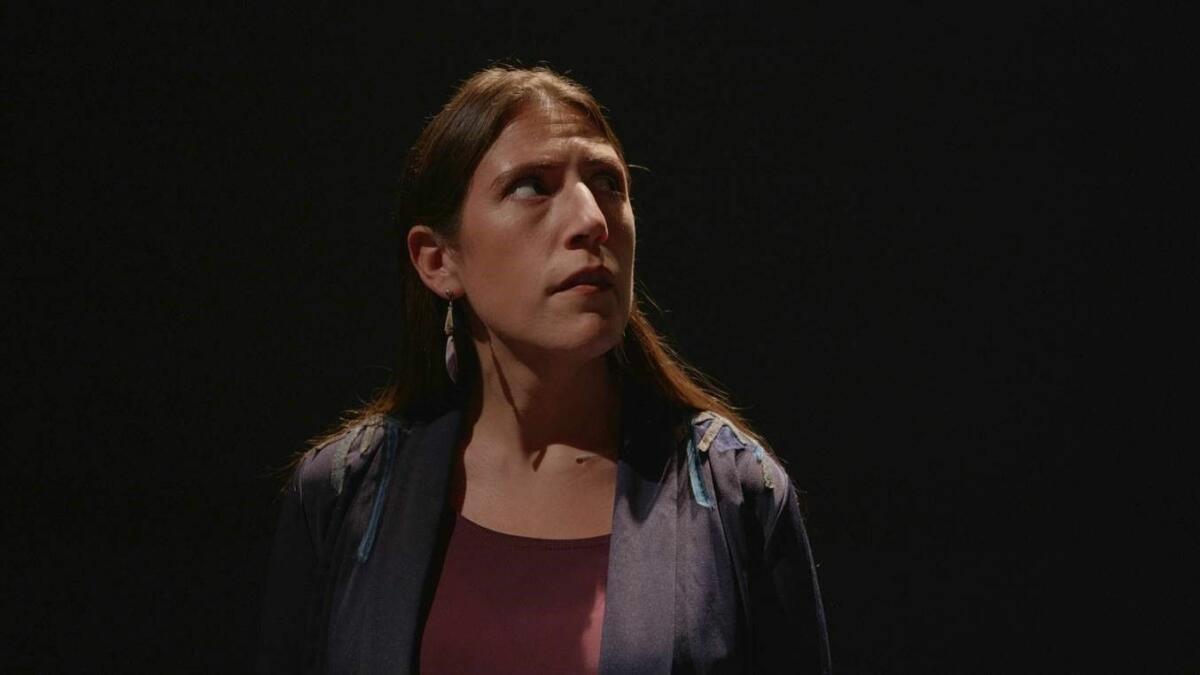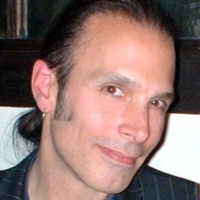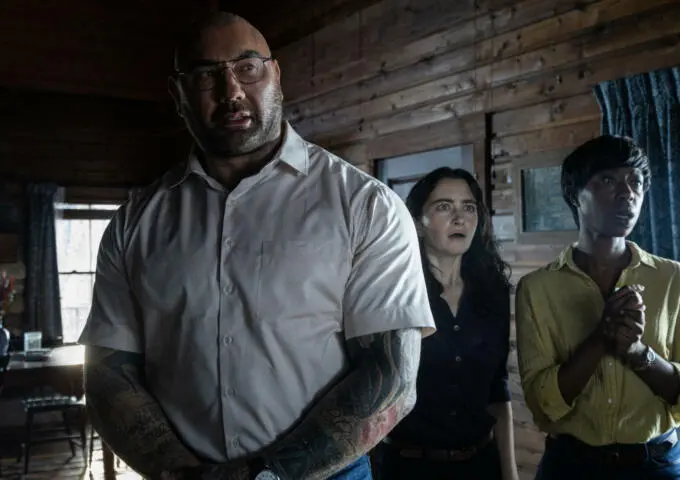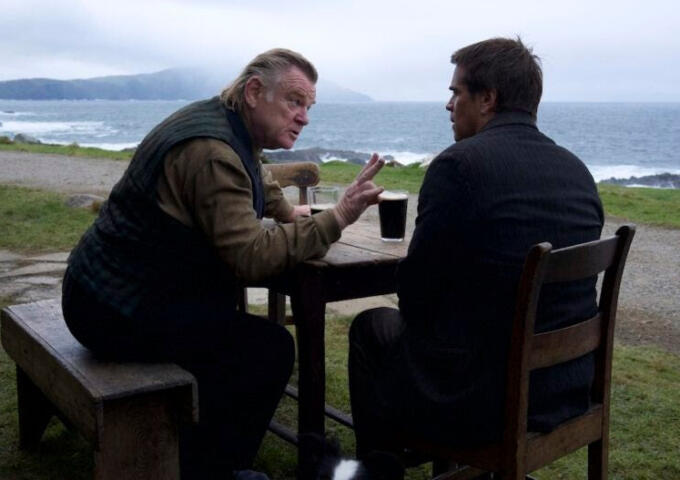Forever connected to her birthright’s roots and traditions of the Mohegan tribe, playwright and director Madeline Sayet has balanced her career toward working, thematically, to personal heritage (“Where We Belong,” “Up and Down the River”) as well as the classicism of theater that touches on Shakespeare (directing remixes of “The Winter’s Tale” and “The Tempest”) and reconfiguring mythology (her re-contextualization of the Leda and the Swan tale, “Daughters of Leda”).
With “Where We Belong,” however – whose world premiere starts at Philadelphia Theatre Company’s Suzanne Roberts Theatre from April 15 to May 8 – Sayet balances the myths and realities of what it means to be Mohegan with her study travels to England to pursue a PhD in Shakespeare. Once there, Sayet finds a country that refuses to acknowledge its ongoing role in colonialism.
“Where We Belong” – directed not by Sayet but rather, Mei Ann Teo – in the playwright’s words, “echoes a journey to England braved by Native ancestors in the 1700s following treatise betrayals… forcing us to consider what it means to belong in an increasingly globalized world.”
PW caught up with Sayet to talk about “Where We Belong” and all that Shakespeare stuff – and her brilliance and incisive observations were present just as expected.
PW/A.D. Amorosi: Certainly, you have written theater pieces that touched on your Mohegan heritage (“Up and Down the River” for one) along with “Where We Belong.” Can you tell me how you psyched yourself to write this finally – put pen to page?
Madeline Sayet: “Up and Down the River” was actually written after “Where We Belong.” At the point when I wrote “Where We Belong” I had never written anything so personal. I had only adapted western classics. And when I first wrote “Where We Belong” it wasn’t really something I envisioned sharely widely with people. So, “Where We Belong” is by far my most vulnerable piece of writing, because it is actually my life at every moment. It’s less that Where We Belong was waiting to come out as a play, and more that this was the form that everything I learned while working on my PhD manifested in. I began writing it to process questions sitting on my chest – not to create a play. The fact that it has become a play that resonates with people and will be so widely shared still baffles me. It wasn’t a matter of psyching myself up to write it – writing it came easily – it was more that the extreme fear and vulnerability came once people wanted me to share it more widely with audiences. Because it’s one thing to write something down privately and another to share what is personal publicly. Each time it is still personal.
PW/A.D. Amorosi: You are as notable a director as you are a playwright. Why did you choose to not direct yourself for “Where We Belong” considering the character your play is you?
Madeline Sayet: I am a director. So I understand what a director contributes to a process. There is no possible way I could be accountable to creating a nuanced performance for myself if I was directing it. Because I cannot both be present as a performer and watch myself perform. Also at the time that Mei Ann was first brought on, I knew the piece was going to globe and Mei Ann has a lot of international experience as a director, and I was thinking about how do we make sure this feels connective not just for indigenous peoples but for other colonized peoples as well. Mei Ann is not indigenous, so throughout its development I also brought other Native theatre artists into the process so that the piece could be developed in community. The Tlingit playwright Vera Starbard serves as dramaturg for this show, and at points during the play’s development I would also bring together groups of other Native actors to read it – so that I could hear the play and respond to it in relationship with them instead of just from inside it.
PW/A.D. Amorosi: I have been going over the script, and copied this, so: Aquy tonkutayuw. Nuwisuwonk Sgayo Jeets… Nutiewhis Acokayis. Nutayuw mohiksuk, ki’ik wuci socum uncas. It speaks of you being a Mohegan, and introduces yourself as such means to keep the heritage and the language alive. Can you talk about the challenge of writing and speaking as such at a time when the richness of language itself is dying in a rush of brief Tweets and smaller attention span writings?
Madeline Sayet: Languages carry with them unique philosophies and ways of seeing the world. Indigenous languages have unique relationships to the places in which they form. There is a great complexity to having one’s language taken away and trying to express themself in a different form, often one which doesn’t have words for the same things. The destruction of indigenous languages is a horrendous act for this reason. So much is lost. And why language reclamation efforts are so very important. In answer to your question: Language formed on Twitter is in relationship to the culture of that space, just as any language exists within a cultural context.
PW/A.D. Amorosi: The other language you discuss within “Where We Belong” is that of Shakespeare, and it seems as deeply and beautifully rooted in you as Mohegan. Is that fair to say? Can you recall that initial feeling, and the challenges of writing “Where We Belong” along the lines of colonialism and reconciliation?
Madeline Sayet: When the first draft of “Where We Belong” was written, I actually hadn’t quit my PhD yet. And even now I am a Clinical Assistant Professor at ASU with the Arizona Center for Medieval and Renaissance Studies (ACMRS), so I have not left behind Shakespeare as people sometimes like to assume. Rather, the contrast between Mohegan and Shakespeare as languages within the piece is about what is centered and valued and why. Shakespeare is promoted as a part of colonial systems, whereas indigenous languages are actively removed. Historically in America policies were created to try to eliminate Indigenous arts and languages, while Shakespeare is the only named playwright in the American common core, despite his not being from here, so it’s important to acknowledge the intentionality of that centering. The ways in which language is weaponized systemically. I thought I could make sense out of my world within Shakespeare when it was all I had to work with. When they were the only plays to be handed to me. The only language I was told was good. But it is not designed to fit the breadth of the cultural frameworks that the Mohegan language contains. And that is the beauty of different cultures and languages. There is no universal. The notion of universalism is so deeply tied to colonialism and missionary complex. The idea that one version could ever hold everyone is so limited compared to the true possibilities of the wide breadth of cultures and languages around us.
PW/A.D. Amorosi: How did you tie that to the treatise betrayals of the 1700s that you speak of in “Where We Belong?”
Madeline Sayet: Each of my ancestors who crosses the ocean in service of my people in the 1700s does so with a kind of hope toward bridge building. Each truly believes that they can make positive change. That they will be listened to. That humanity is still indeed good and they will be treated fairly. Yet, each one of them is reminded that they are not seen as human in the eyes of the colonizer as their people are betrayed and their pleas ignored despite the compromises they have made in honor of good relations. I cross the ocean believing that I can use Shakespeare to help people understand indigenous issues, just like Occom believes he can use the Bible. But ultimately, no matter how much we try to use words they understand and meet them on their terms, it is not enough.
PW/A.D. Amorosi: Let’s talk about premiering this in Philadelphia; how and why did this come to pass, and how aware of you/connected are you to this city’s indigenous heritage?
Madeline Sayet: The performances in Philadelphia are the first stop on a National Tour for the production produced by Woolly Mammoth Theatre Company in association with The Folger Shakespeare Library. Broadway and Beyond Theatricals are the executive producers on the tour. Philadelphia Theatre Company artistic director Paige Price was attracted to the work early on and thats how it became the first tour stop. The Lenape are a strong presence not just through Philadelphia but also through the rest of Lenapehoking, including New York City. I am honored that the play will be performed on Lenape land, but far more excited by what Lenape stories the theaters here might offer a platform for next.
PW/A.D. Amorosi: You have built activism into this tour with its “community accountability rider.” Can you discuss this and how it fits into this city and the Philadelphia Theatre Company in particular? Is the land that the theater occupies a one time Native land? Are there any past instances of “redface” at the institution, or of non-Native actors playing Native parts?
Madeline Sayet: I know that Philadelphia Theatre Company has partnered with local indigenous organization We Are The Seeds for some corollary events, and that there will be readings by local Native writers, but I am still learning the details of the ways in which they are meeting the rider, as they plan. PTC signed the rider so it is the hope – but only time can ever tell with things like this.
PW/A.D. Amorosi: How are you hoping it will change indigenous and non-indigenous audiences when “Where We Belong” is over?
Madeline Sayet: For Non-Native audiences: I hope that there will be a strong desire to hear more Native stories and to also engage deeply with the questions the play asks in relationship to your own lives. For Native audiences: Every indigenous story has as much right to be told onstage and is at least as or more necessary.





